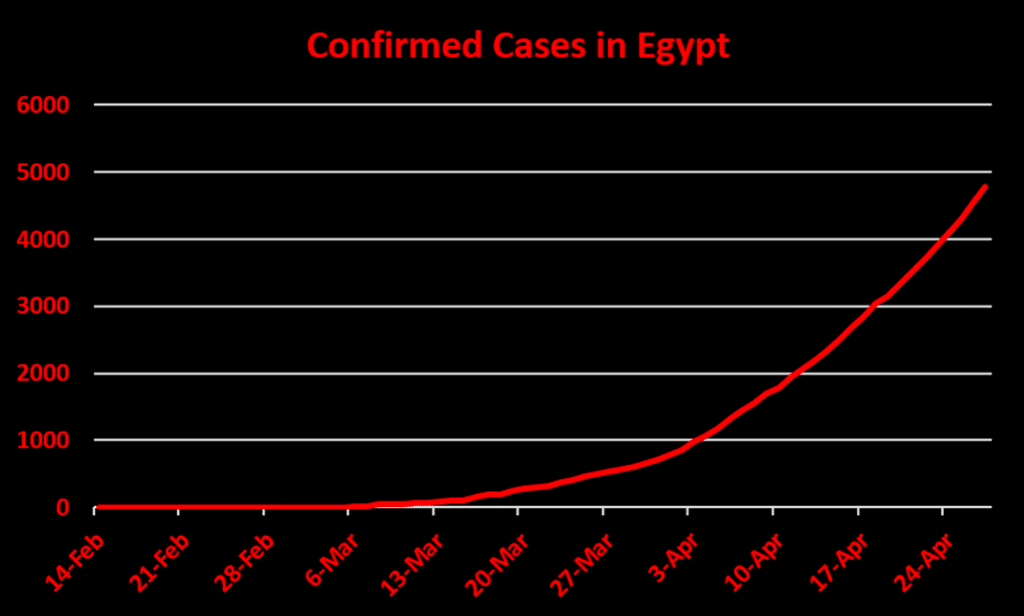April 27, 2020 | Policy Brief
COVID-19 in Egypt
April 27, 2020 | Policy Brief
COVID-19 in Egypt
As political and economic difficulties from COVID-19 challenge the stability of the Egyptian government, Cairo has responded by tightening control – an effort that opposition forces claim is designed to expand authoritarian repression. This dynamic is an extension of a political battle that has been ongoing since the 2013 power struggle that brought President Abdel-Fatah el-Sisi to power.
Situation Overview
Egypt reported its first coronavirus case – also the first in Africa – on February 14. As of April 27, Egyptian authorities have reported 4,782 confirmed cases, including 337 fatalities. It is highly likely that the count is being underreported. The country’s public health infrastructure, much like that throughout the rest of North Africa, lacks depth. The likely discrepancy between Cairo’s numbers and reality was reported by Canadian disease specialists in late March, drawing the ire of the Egyptian government.
Cairo has taken several appropriate steps to contain the pandemic. On March 15, the government announced the closure of all air traffic from its airports, followed by a closure of schools, restaurants, cafes, mosques, and churches. Egypt has since imposed a nationwide curfew, suspended public transportation, and placed a ban on public gatherings for the country’s celebration of spring, Sham an-Nessim. As of April 27, the nightly curfew remains in place but has been pushed back an hour in celebration of Ramadan. Communal prayers are also banned this Ramadan.
COVID-19 in the Greater Middle East
| Country | Cases | Deaths |
| Turkey | 110,130 | 2,805 |
| Iran | 91,472 | 5,806 |
| Saudi Arabia | 18,811 | 144 |
| Israel | 15,466 | 202 |
| Pakistan | 13,909 | 292 |
| Qatar | 11,244 | 10 |
| UAE | 10,349 | 76 |
| Egypt | 4,782 | 337 |
| Morocco | 4,115 | 161 |
| Algeria | 3,382 | 425 |
| Kuwait | 3,288 | 22 |
| Bahrain | 2,708 | 8 |
| Oman | 2,049 | 10 |
| Iraq | 1,820 | 83 |
| Afghanistan | 1,703 | 57 |
| Tunisia | 949 | 38 |
| Lebanon | 710 | 24 |
| Somalia | 480 | 26 |
| Jordan | 449 | 7 |
| W. Bank & Gaza | 342 | 2 |
| Sudan | 275 | 22 |
| Libya | 61 | 2 |
| Syria | 43 | 3 |
| Yemen | 1 | 0 |

Data current as of 1:00 PM, April 27, 2020.
Implications
Public protests against stringent public health measures are common worldwide. But in Egypt, there was already significant tension between the government and the political opposition. The Muslim Brotherhood, which has been at odds with the state since Sisi toppled the government of Mohammad Morsi in 2013, has sought to exploit the political and economic crisis.
Anti-government organizations have urged supporters to use COVID-19 as a predicate to fight the state. One Muslim Brotherhood activist based in New York urged infected sympathizers to shake hands with Egyptian soldiers, policemen, judges, and government officials.
Islamists also continue to engage in anti-Christian terror activity. In Cairo, security forces thwarted a planned terrorist attack against the Coptic community, which makes up 10 percent of Egypt’s population and has suffered attacks since the 2011 revolution. The Muslim Brotherhood and other Islamist groups have accused Egypt’s Copts of colluding with the government.
What to Watch for
COVID-19 is hitting the Egyptian economy particularly hard. Tourism, already at historic lows after the tumult of the Arab Spring, is now flatlining. Meanwhile, remittances from Egyptian workers in the Gulf, which have played a key role in Egypt’s relative economic stability since 2017, are set to virtually disappear. Even aid from Saudi Arabia and the United Arab Emirates may dry up as oil prices plummet.
According to NKC African Economics, the Egyptian economy is projected to contract by 1.7 percent in the coming year. That, alongside estimates that nearly 60 percent of Egypt’s population is poor or vulnerable, paint a troubling economic picture that could impact the stability of the Egyptian regime.
A debate over incarceration policies could also undermine political stability. Egypt has the highest incarceration rate in Northern Africa. The prison population of 106,000 (60,000 of whom are political prisoners) is vulnerable to COVID-19. While jails are emptying worldwide, Egypt continues to imprison its most outspoken critics, the majority of which are members of the Muslim Brotherhood. The political battle continues, and the possibility of COVID-19 spreading through prisons threatens to exacerbate the already hostile relations between the Brotherhood and the government.
Philip Kowalski is a research associate at the Foundation for Defense of Democracies (FDD), where he also contributes to FDD’s Center on Military and Political Power (CMPP). For more analysis from Philip and CMPP, please subscribe HERE. Follow Philip on Twitter @philip_kowalski. Follow FDD on Twitter @FDD and @FDD_CMPP. FDD is a Washington, DC-based, nonpartisan research institute focusing on national security and foreign policy.